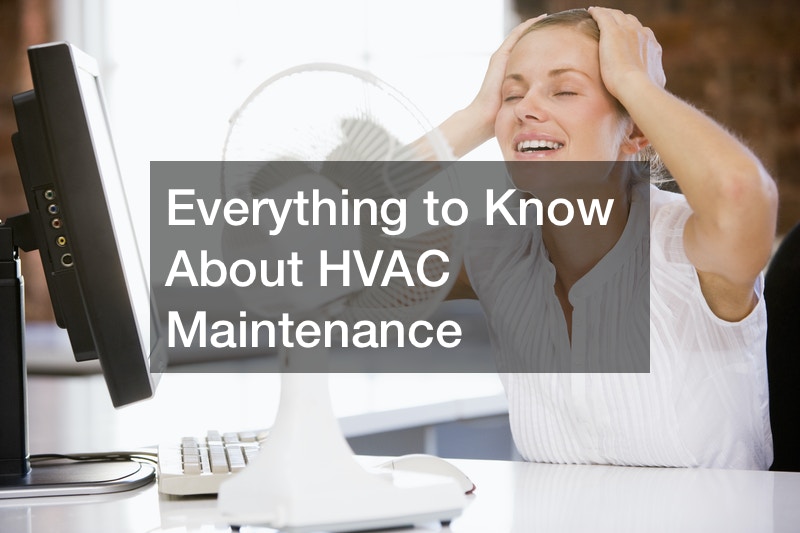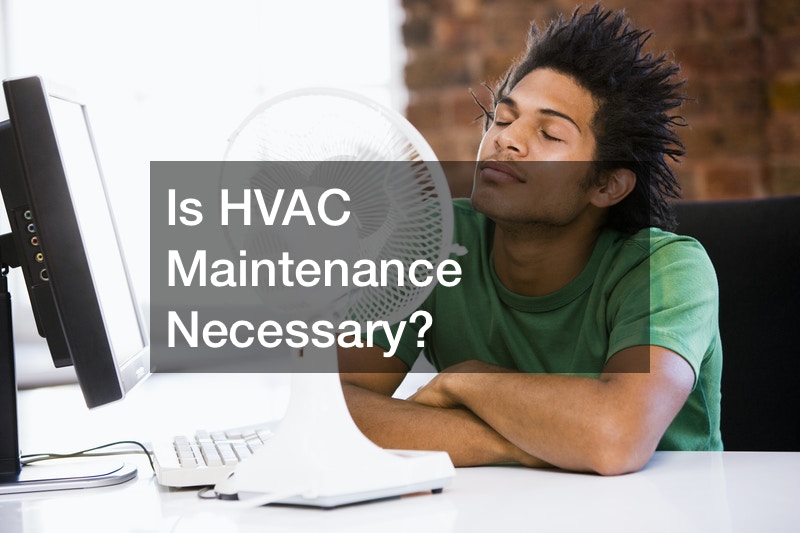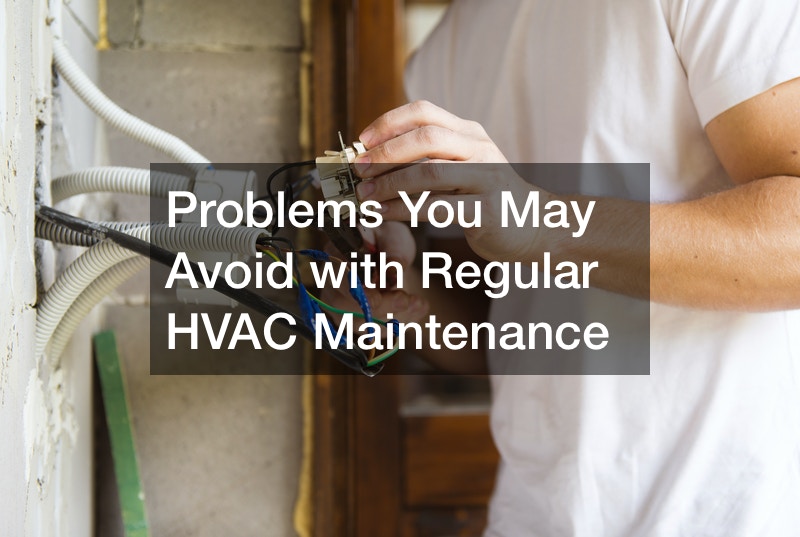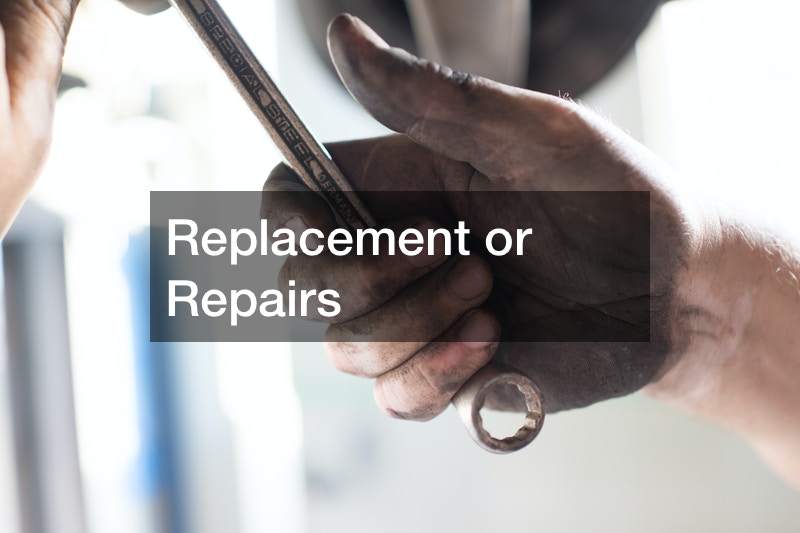
HVAC systems are a must-have no matter where you live. They save us from the cold in the winters and the blazing sun in the summers. HVAC maintenance is crucial to enjoying your unit for a longer time. Your HVAC unit is subject to wear and tear because it’s being used all around the year. However, when it isn’t properly maintained, these small issues might get worse down the line.
Your HVAC unit might strain and collect debris and dirt over time. Without proper maintenance, the unit circulates old, stale air, risking your family’s health. It would help if you had a well-maintained HVAC unit for a comfortable indoor climate year-round. Read this guide to understand everything about giving your unit some tender loving care and more!
Is HVAC Maintenance Necessary?
Like any other appliance in your house, your HVAC unit needs to be occasionally maintained. Doing a regular maintenance routine ensures your heating and cooling runs smoothly throughout the year and beyond. You must have heard the ancient saying, “A stitch in time saves nine.” Well, it might be truer for your HVAC unit.
Most of us ignore or forget to properly maintain it, or worse: we ignore the issue until it becomes too big for us to handle. At which point you might have to contact a home heating contractor to fix the issue. That, of course, is super expensive! For best working and performance, be regular with your maintenance routine. That way, you can handle any issue before it becomes a nuisance. Here are the top five benefits of maintaining your HVAC unit.
- Increased Lifespan: If you’re a car enthusiast, you probably spend time monthly ensuring your car is in tip-top condition at all times. That’s because you need it to last longer. Similarly, HVAC maintenance improves your home’s heating and cooling systems. Preventative measures lower the repair cost by approximately 95%. With a proper maintenance routine, your unit won’t need major repairs and will last for a longer time.
- Energy Savings: Regular maintenance checks help you to save approximately 5% to 40% of your energy bill.
- Cleaner and Fresher Air: When dust accumulates in your unit, it causes many health problems, particularly among asthmatic people. Dust isn’t the only thing that accumulates in dirty filters and pipes. Many chemical pollutants and microbes also lurk in the improperly filtered air in your home, like bacteria, mold, pet dander, and cigarette smoke. That means you’re at risk of developing allergies because of constant exposure to all these harmful chemicals. HVAC maintenance ensures all vents, ducts, filters, and pipes around your home are free from harmful chemical particles and dust for good.
- Avoid Carbon Monoxide Poisoning: Since HVAC units use fuel, they have a risk of leaking carbon monoxide into your house. This gas has no fumes or smell, so you can’t tell if your house is affected or not. Carbon monoxide is a hazard to your health, even in small quantities. Preventative measures for HVAC systems should include tests to check the carbon monoxide level in your home. With regular maintenance, you can protect your family from Carbon Monoxide poisoning.
- Greater Quality Of Life: It’s very frustrating when your heating and cooling units keep turning on and off during peak winters and summers. Why should you have an HVAC unit that can’t function when needed? Regular maintenance routine greatly helps to avoid such unpleasant experiences. When all the units operate as they should, it won’t only make your house cooler or warmer but also give you the peace of mind you deserve.
So, How Often Should You Do HVAC Maintenance?
The short answer: ‘whenever you use your HVAC unit’. If you’re using it and haven’t inspected it for a while, you need to contact a professional ASAP! Get the unit checked up before you get into trouble. However, there’re two main times annually that need preventative HVAC unit maintenance.
- Every 3 to 6 months: It’s mandatory to have your air conditioners checked up before the summertime by an experienced AC repair contractor. Your heating system needs a check-up before the winter sets in. The more you use your unit, the more it needs maintenance. Homeowners with a heat pump system need a bi-yearly check-up to run all days of the year smoothly.
- Once a year: Yearly maintenance is enough for both units if you own a furnace unit and a standard AC unit.
Is HVAC Maintenance Costly?
Yes, HVAC unit maintenance is an ongoing cost, but it’s a wise investment. Parting with approximately $75 to $150 twice yearly is better than replacing your entire unit every year due to neglect. However, every HVAC company often has special promotions to lower maintenance costs. So, ensure you request any offer whenever you schedule your checkups.
Problems You May Avoid with Regular HVAC Maintenance
A heating and air conditioning unit has many parts; hence, several problems might arise. Luckily, most of these issues are avoidable with one simple service- regular maintenance! Checkups help fix damages caused by tear and wear so your unit parts don’t malfunction, and minor unit problems are identified and fixed before developing into something that shows noticeable signs and needs serious repair. Regular HVAC unit maintenance helps prevent problems like:
- Tripped breakers
- Blown fuses
- Thermostat malfunctions
- Overheating
- Ignition system malfunctions
- Short cycling
- Heat exchanger damage
- Poor airflow
- Water leaks
- Poor heat transfer
Replacement or Repairs
If during the checkup, your heating contractor notices any damaged or worn out parts, then they will replace or repair what they can during the maintenance checkup. If the heating service contractors don’t have the tools ready, they can order the needed parts and later plan a follow-up service call. However, you can lower costs by keeping some spare parts in your home. Ensure you liaise with your technician to purchase the right spare parts. Below is a list of what you need to stock to lower maintenance costs:
- Thermostat batteries
- Fuses
- Air filters
- Coil condenser cleaners
- Belts
- Thermostat
This step can also include replacing fluids. Your AC system uses refrigerant to run properly, and improper fluids cause damage or inefficiencies. A low level of refrigerant signifies a leak or other issues, which your expert needs to check before adding more refrigerant.
The Top Tell-Tale Signs That Your HVAC Unit Needs Maintenance
When was the last time you did an HVAC repair or maintenance? If it was too long ago, then you better look at these signs that show the unit needs some urgent attention:
- Blocked Vents: Picture this, as the temperatures rise, you turn on your unit, expecting it to blow in some cool breeze. Instead, you find your AC unit barely has any airflow! If that’s the case, then your unit probably has blocked vents. It takes a shorter time for dirt to build up in your unit; hence interfering with the overall operation of your unit.
- Unusual Spike In Electric Bill: Contact a professional if your electricity bill is higher than normal. It’s normal for your energy bill to shoot when the temperatures fall or rise. However, a consistently increasing or high bill signifies that your unit might be acting differently.
- Leakage In Refrigerant Lines: Does it feel like your air conditioning or heater has been operating the entire day, but it isn’t doing its job? This might be a sign of leaking refrigerant lines and connectors. Some parts of your unit are more prone to leakages than others and can get damaged easily. Tear and wear cause the refrigerant lines that form the main connection between the outdoor HVAC unit and your home to leak. The warm or cool air will then escape from pipes due to damages. Because of this, the unit has to overwork, yet it only performs below average.
- Recurring Issues: Your unit might have some issues that seem to solve on their own but reappear after some time. The solution: small repair work and adjustments to solve the underlying problem. But if your unit has too many recurring issues, you might better consider purchasing a new one. Repairing it might not be worth it.
- Noisy HVAC System: Is your air conditioning or heater noisy? Don’t ignore it. Besides being noisy, strange rattling and noises produced are a cause of concern. It might mean your unit needs some repairs. So, next time you think your unit is noisy, you might want to contact one of your local AC contractors to fix the issues.
Tips on How to Do HVAC Maintenance At Home
The more often you invest in the maintenance of your unit, the better, of course. However, you don’t always have to contact a professional technician to maintain. You might not be able to diagnose electrical issues or replace broken parts. However, there are a few tasks you can DIY to keep your unit operating smoothly before official check-ups. The following are the best DIY tips on maintaining your HVAC unit:
- First Step The first thing you need to do is shut off your unit. There’s a lot of moving parts in your HVAC unit and complex electrical parts you’ll want to avoid. Stay safe by powering off your system first. You should be able to locate a shut-off box near your exterior unit or shut off the power from the breaker unit.
- Clean the Outdoor Unit: An air conditioner unit has an outdoor condenser unit with a fan on top. This unit collects twigs, dust, leaves, and whatnot as it’s outside. They need to be cleaned up before they start clogging the fan. Use water to clean up this debris easily. However, avoid using pressure water as it causes damages to the fan blades. Also, while cleaning it, ensure you inspect any damages on the blades.
- Replace Filters: It’s horrifying to know how much debris and dust your unit’s filters collect in a short time. You need clean airflow in your home. So, it would help if you bought new filters every couple of months. Furthermore, high-quality filters help save on your energy bill. Ideally, it’s a win-win situation!
- Unclog Pipes Drainpipes quickly become the hub for algae and mold if they aren’t unclogged immediately. To avoid this problem, mix some bleach with water in a bucket, and flush it down the unit’s pipes. This helps unclog any blockages.
- Cut Water Supply to Humidifier During Summers: Most homeowners forget to cut the water supply to the furnace humidifier during summer. There’s no point in running the humidifier when you aren’t using it. So, ensure you also cut off the water supply when turning on your furnace.
- Check Carbon Monoxide Levels: Carbon monoxide is a fatal gas when inhaled, even in small quantities. It’s undetectable, so you’ll have to install a carbon monoxide detector in the house as a protective measure. If you have one, ensure you replace its battery every few months to ensure it’s working.
- Inspect Refrigerant Lines Damages on refrigerant lines affect not only your home’s temperatures but also the general functioning of the unit. And to worsen the situation, it increases your electricity bill! Inspect these lines as often as possible to ensure they’re damage-free.
Preventative and regular HVAC maintenance is a must for the proper functioning of your unit. It’s common for homeowners to forget to maintain their HVAC units until they’re worn out. Don’t procrastinate! Instead, deal with all your unit routine checks. This way, you’ll avoid dealing with unpredictable system breakdowns during chilly winter nights or the steaming summer days.
Proper maintenance saves on the energy bill and extends your unit lifetime, so you won’t have to replace it sooner. That’s thousands of bucks in savings! So, if you haven’t maintained your unit for a while, probably this is the right time to look into it.






